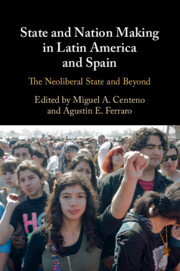Book contents
- State and Nation Making in Latin America and Spain
- State and Nation Making in Latin America and Spain
- Copyright page
- Dedication
- Contents
- Notes on Contributors
- Preface
- Part I Introduction
- Part II Economic and Territorial Power
- 2 The Chilean Neoliberal State
- 3 State, Society, and the Neoliberal Turn in Mexico, c. 1980–c. 2000
- 4 Rise of the Neoliberal State in Spain? Fiscal Shortcomings of a Popular Narrative
- 5 Guatemala
- Part III Infrastructural Power: Reform Strategies
- Part IV Symbolic Power: Identities and Social Protest
- Part V Conclusions
- Index
- References
2 - The Chilean Neoliberal State
Origins, Evolution, and Contestation, 1973–2020
from Part II - Economic and Territorial Power
Published online by Cambridge University Press: 03 August 2023
- State and Nation Making in Latin America and Spain
- State and Nation Making in Latin America and Spain
- Copyright page
- Dedication
- Contents
- Notes on Contributors
- Preface
- Part I Introduction
- Part II Economic and Territorial Power
- 2 The Chilean Neoliberal State
- 3 State, Society, and the Neoliberal Turn in Mexico, c. 1980–c. 2000
- 4 Rise of the Neoliberal State in Spain? Fiscal Shortcomings of a Popular Narrative
- 5 Guatemala
- Part III Infrastructural Power: Reform Strategies
- Part IV Symbolic Power: Identities and Social Protest
- Part V Conclusions
- Index
- References
Summary
Chile is the birthplace of neoliberalism in Latin America. A group of rightwing economists, the so-called Chicago boys, convinced Pinochet to abandon the state-led developmental model that had been dominant in the country since the early 1930s. Instead, they began to apply in April 1975 an orthodox neoliberal model based on free market principles. By this, Chile pioneered the adoption of neoliberal policies in Latin America and the Western world as it preceded the emergence of Thatcherism and Reaganomics in the Northern hemisphere. Neoliberal rule deeply reshaped Chilean society, leading to a fast process of capitalist modernization and cultural transformation. The neoliberal model survived the end of military rule in 1990 and still plays a pivotal role in the Chilean economy today. This study aims to explain the remarkable longevity and relative strength that has characterized neoliberalism in Chile. The neoliberal model has been seriously challenged by the October revolt in 2019 and by the leftwing government led by Gabriel Boric since March 2022. But despite attempts to dismantle it, the neoliberal model has proved to have taken deep roots in Chilean society.
- Type
- Chapter
- Information
- State and Nation Making in Latin America and SpainThe Neoliberal State and Beyond, pp. 67 - 98Publisher: Cambridge University PressPrint publication year: 2023
References
- 1
- Cited by

